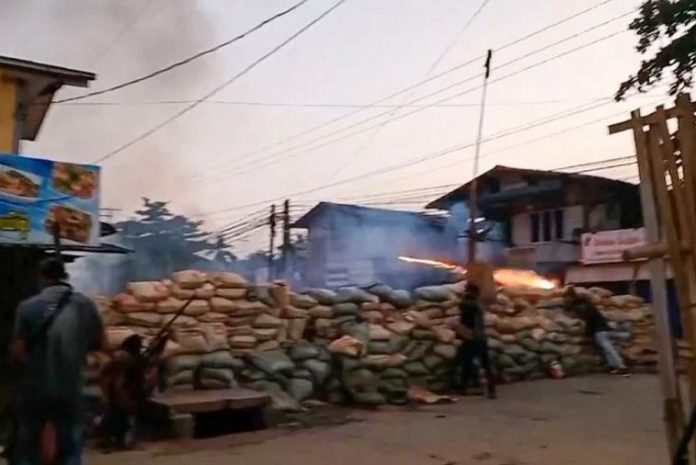Myanmar’s own ambassador to the United Nations has called for a no-fly zone and sanctions, as the international community puts more pressure on the military government to end a deadly crackdown and restore democracy, and as the death toll continues to rise with dozens more reported killed early on Saturday.
The United States and European nations pleaded for action at a meeting on Friday of the UN Security Council where a Southeast Asian summit on the crisis was taking shape, but the military leadership remained defiant and refused entry to a UN special envoy.
Ambassador Kyaw Moe Tun, who has passionately rejected the February 1 coup and brushed aside the military’s claims that he no longer represents Myanmar, told the Security Council that there has been a “lack of adequate and strong action” despite hundreds of deaths, including children.
“Your collective, strong action is needed immediately,” said Kyaw Moe Tun, in virtual remarks as he sat before the Myanmar and UN flags.
“I strongly believe that the international community, in particular the UN Security Council, will not let these atrocities keep going on in Myanmar.”
The ambassador called for a no-fly zone to “avoid further bloodshed caused by the military air strikes on civilian areas”.
He also asked for an international arms embargo and the freezing of bank accounts associated with members of the military and their families.
All foreign direct investment should also be suspended until the restoration of the democratically elected government, the ambassador said.
The diplomat’s call came as reports emerged of more deadly crackdowns in the country, with at least 60 civilians killed on Friday night and into Saturday morning during protests in the Bago division outside of the largest city of Yangon.
According to Radio Free Asia, civilians were reportedly shot at using live ammunition as security forces started dismantling a barricade set up by the protesters. Several people were also reportedly taken by police without arrest warrants.

Beijing’s veto power
China and Russia wield veto power at the Security Council and generally oppose international sanctions, although Beijing – the top ally of Myanmar’s military – has voiced growing concern about instability in its neighbour.
Linda Thomas-Greenfield, the US ambassador to the United Nations, said the military “needs to feel the cost associated with its horrific actions” after ignoring previous condemnation.
“Will the Council quibble over language in yet another statement or will we act to save the lives of the Burmese people?” she said, using Myanmar’s former name, Burma.
Estonia, a non-permanent member of the Council, called for work on a resolution that would include sanctions and an arms embargo.
Diplomacy steps up
With violence rising and refugees flowing out of Myanmar’s borders, regional powers have also stepped up efforts to find a resolution.
A long-mulled over summit on Myanmar of the Association of Southeast Asian Nations will take place on April 20, Nathalie Broadhurst, France’s deputy ambassador to the United Nations, told the Security Council.

Diplomats said that the meeting was expected to be in person in Jakarta, the headquarters of ASEAN, but that there were divisions within the 10-nation bloc.
“At one end, there are Thailand, Laos and Cambodia, who are in the mode of ‘back off, there’s nothing to see, it’s a question of internal politics,’” one diplomat said, while Singapore, Malaysia and Indonesia are open to a more active role for ASEAN.
Another diplomatic effort faced immediate opposition from the military government, which refused to let in the UN special envoy for Myanmar, Christine Schraner Burgener, who is on a tour of Asian countries.
“We have not permitted this. We also have no plan to allow it at this moment,” spokesman Zaw Min Tun told the AFP news agency.
Burgener had sought face-to-face meetings with the military, as well as civilian leader Aung San Suu Kyi, who has been detained since the coup.
In a further sign of discreet but growing diplomatic outreach, there have been reports that China has opened contacts with the CRPH, a group representing the deposed civilian government.
A foreign ministry spokesman in Beijing said China was in contact with “all parties” as part of efforts to restore stability.

Hundreds killed
At least 618 civilians have been killed in the military’s crackdown on protests and nearly 3,000 arrested, according to the Assistance Association for Political Prisoners on Friday.
The death toll does not include the estimated 60 people killed in Bago overnight and into Saturday.
UN rights officials said the military is making increasing use of heavy weaponry including rocket-propelled and fragmentation grenades, heavy machine guns and snipers.
The military insisted it was responding proportionately to what it said are violent protesters.
Meanwhile, 19 people have been sentenced to death for allegedly killing an associate of an army captain, the military-owned Myawaddy TV station said on Friday, the first such sentences announced in public since the coup.
The report said the killing took place on March 27 in the North Okkalapa district of Yangon, Myanmar’s biggest city. Martial law has been declared in the district, allowing courts-martial to pronounce sentences.
Source: AL JAZEERA AND NEWS AGENCIES
















